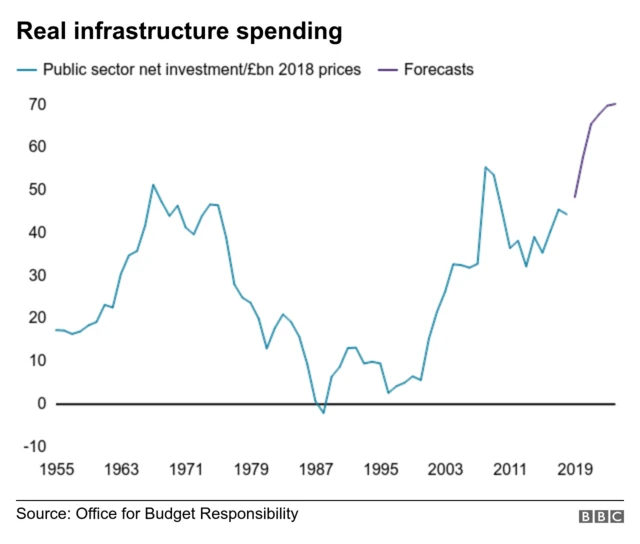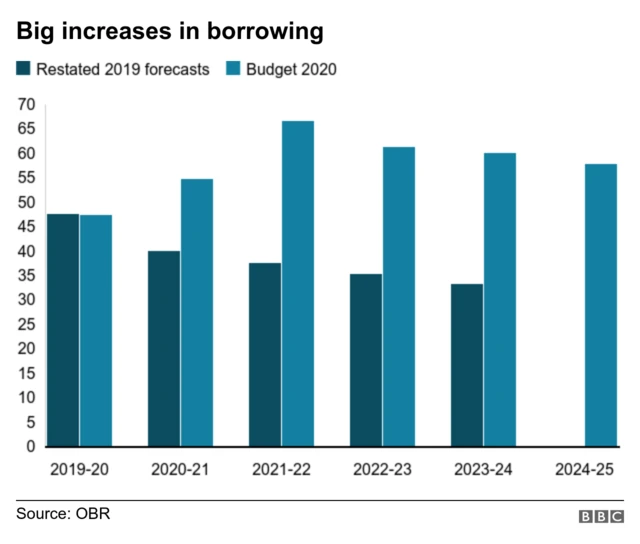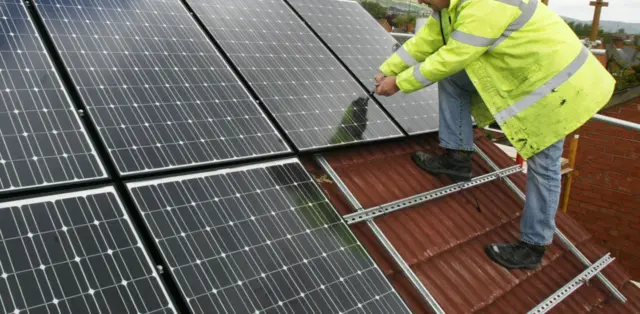More coronavirus myths to ignorepublished at 00:06 GMT 23 March 2020
Reality Check tackles misleading health advice being shared online.
Read MoreReality Check tackles misleading health advice being shared online.
Read MoreThe misleading coronavirus health advice being shared online.
Read MoreWe fact-check claims about ibuprofen that have circulated across social media.
Read MoreWith Italy grappling with the coronavirus outbreak, misleading news has also been spreading.
Read More Reality Check
Reality Check
The government is going to raise infrastructure spending (which is money for things like building roads and hospitals) to unusually high levels, even after taking into account rising prices.
There have been various numbers used, but this chart of public sector net investment, adjusted for inflation, shows the planned increase.

The only time we have got close to these levels was in 2008-09 and 2009-10, when the government brought forward spending to help boost the economy during the financial crisis.
But governments have found it very difficult over the years to spend as much as they've planned to on infrastructure, as Reality Check explained in this piece.
 Reality Check
Reality Check

The spending in this Budget is being largely paid for with a big increase in government borrowing.
The government expects to borrow almost £100bn more in this Parliament (before mid-2024) than was expected the last time we had any forecasts.
And that figure does not include £12bn to be spent on getting the economy through the coronavirus outbreak.
The Treasury documents say that money will be accounted for in the next Budget in the autumn.
 Reality Check
Reality Check
The chancellor is talking about the use of statutory sick pay (SSP) to support people isolating themselves because of coronavirus.
SSP is paid by employers, so self-employed workers are not eligible, but agency workers are. (There are other measures for the self-employed, who have to self-isolate, in this Budget).
You have to be earning at least £118 a week to qualify for it.
It is set at £94.25 a week, although of course employers may pay more if they want to.
To put that into context, average weekly earnings , externalin December last year stood at £544 a week.
Garlic and taking hot baths are among the dodgy health advice for treating coronavirus being shared online.
Read MoreThe US Democratic frontrunner has been criticised over his spending plans - so how much would they cost?
Read More Reality Check
Reality Check
There's been lots of talk about whether workers in the UK who have to isolate themselves due to coronavirus will be eligible for statutory sick pay (SSP), which is a payment of £94.25 a week paid to employees and agency workers (not self-employed people) who are unable to work.
You also need to be earning at least £118 a week to get SSP. Trade union umbrella body the TUC said that 2m workers would be ineligible on this basis, as they don't earn enough.
We couldn't find that figure so we asked the Office for National Statistics to work it out for us.
They estimated , externalthat there were 1,766,000 jobs done by adults in the UK which paid less than £118 a week. The number of people involved is likely to be somewhat lower than this because one person could have more than one of these jobs.
About 70% of those jobs are done by women.
 Reality Check
Reality Check
UK Health Secretary Matt Hancock has been trying to reassure people who are worried about losing money if they have to isolate themselves because of coronavirus.
He told BBC Radio 4's Today Programme: "We've got a statutory sick pay system in this country and self-isolating for medical reasons if you're healthy counts as being sick in the legislation."
Statutory sick pay is paid by employers, so self-employed workers are not eligible, but agency workers are.
It is set at £94.25 a week, although of course employers may pay more if they want to.
To put that into context, average weekly earnings, external in December last year stood at £544 a week.
 Reality Check
Reality Check
 Image source, Getty Images
Image source, Getty ImagesA caller to BBC Radio 4's Any Answers programme over the weekend said she was just back from a tour of Asia, and that while her temperature had been checked at airports in Thailand, Malaysia, Hong Kong and Singapore, there were no checks when she returned to Heathrow.
Screening at airports is an issue for Public Health England, who told us that they had introduced "enhanced monitoring" for passengers arriving from countries such as China, Iran, Japan and Malaysia, but not temperature checks.
"Expert advice suggests clinical entry screening (for example through temperature checks) would be of very limited effectiveness and detect only a small minority of cases as symptoms," they said.
"This is because symptoms do not usually appear until 5-7 days, and sometimes up to 14 days."
The enhanced monitoring means having medical staff at airports to meet direct flights from hot spots, giving information about symptoms to passengers and encouraging them to say if they are feeling unwell.
Recent academic research, external ran simulations that suggested temperature checks at airports would catch just over half of coronavirus-infected passengers.
It's a leap year which means there's an extra day in the calendar - 29 February 2020. But why do we need it?
Read MoreThe UK and EU have set out their stalls for negotiations on their future relationship.
Read MoreEuropean nations have been struggling to agree how to deal with migrants trying to cross the Mediterranean.
Read More Reality Check
Reality Check
 Image source, PA Media
Image source, PA MediaBoris Johnson said at PMQs: "99% of all the solar panels installed in this country have happened under this Conservative government".
If you count "this Conservative government" as starting with the coalition with the Liberal Democrats in 2010 then he's right, according to BEIS statistics., external
If you measure from 2015, more than 60% of capacity had already been installed by then.
If you look at data, external from the International Energy Agency, it turns out that about 96% of the world's solar generating capacity has been installed since 2010.
The UN warns that time is short to stop locusts threatening food supplies in some countries.
Read MorePresident Donald Trump is on his first official visit to India.
Read MoreIndian and Bangladeshi politicians are feuding over India's moves to restrict citizenship - we check their claims.
Read MoreThere are a lot of negotiations to be done this year. Chris Morris looks at how they should be done.
Read More